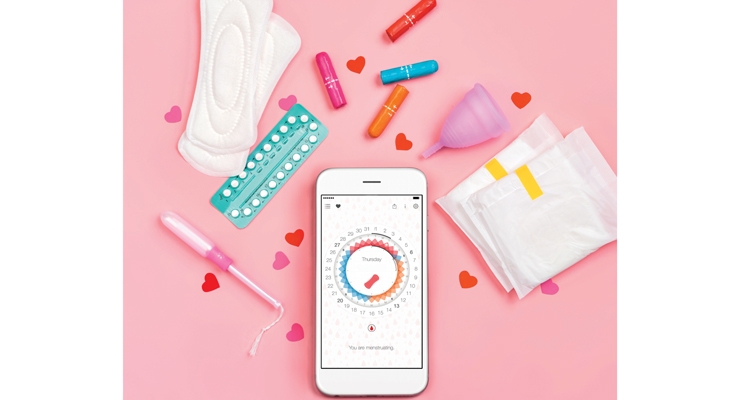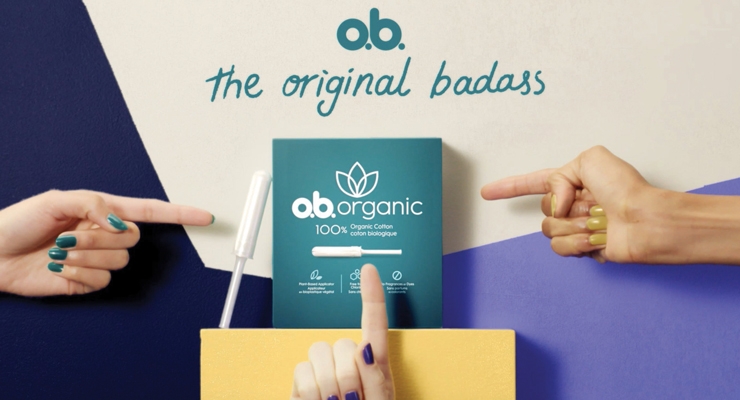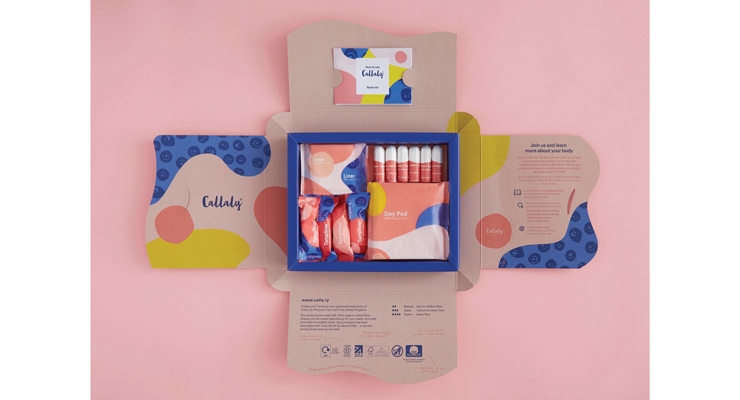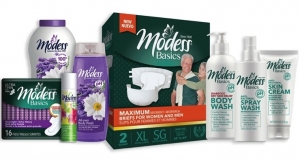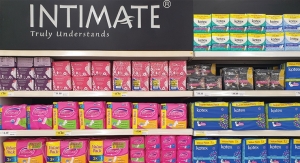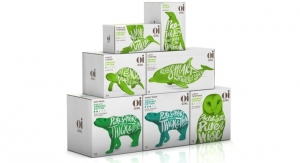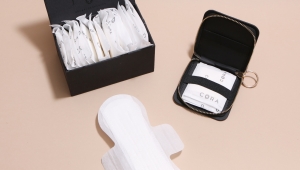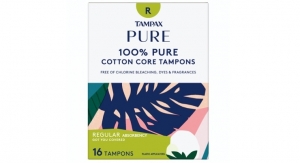Karen McIntyre, Editor11.08.19
According to industry statistics, the average woman generates 130-200 kilograms of waste each year on feminine hygiene products alone. When compounded over 40 years of menstruation, that figure can reach nearly 10,000 kg of garbage in a lifetime. As female populations rise worldwide and the penetration of feminine hygiene product usage increases in developing regions, the amount of feminine hygiene waste entering landfills is substantial.
Add to this pending legislation in the European Union and the U.S. limiting the amount of single-use (SUP) products that can enter landfills and it is becoming clear to all the stakeholders involved that alternatives are necessary and this has led to the development of a number of alternative products that are giving women more choices every month.
“The number of new companies and new products is kind of mind boggling,” says Pricie Hannah, principal of absorbent products consultancy Price Hannah Inc. “I think that it helps that these companies can get attention through the internet. You don’t have to come up with a huge promotional budget to get noticed.”
Industry research shows that the success of these new products has largely been driven by young women in the 18-34-year-old category who cite environmental and health concerns about traditional disposable period products.
According to sustainability marketing firm Shelton Group, nearly 40% of women in this category have switched or are considering switching to reusable products to manage their periods.
It is this mindset that has diversified a category, once dominated solely by tampons, sanitary pads and napkins to now include new formats like reusable menstrual cups and reusable absorbent underpants. These products are currently only a blip in the massive global feminine hygiene market with menstrual cups holding just a 3.2% ($995 million) share and reusable pants holding even a smaller share with sales of just $79 million, but both formats are attracting significant attention and esperts expect sales to grow significantly in the next few years.
Suretly, national brands are taking not. Procter & Gamble , the maker of Always pads and Tampax tampons, launched a menstrual cup under its Tampax brand in late 2018 and Kotex maker Kimberly-Clark invested $25 million in Thinx, a maker of period-proof underwear designed to offer an eco-friendly alternative to pads and tampons. The company’s period-proof innerwears are made by using quad-dry breathe technology, with thin materials that resist stains and leaks, wick moisture and provide anti-bacterial support.
K-C’s investment will enable Thinx to launch a lower-cost line of underwear priced between $15 and $19 a pair, compared to the current options with prices between $32 and $39.
“We want people to have access to our underwear just as easily as they can pick up a pad, pantyliner, or tampon—and, as with any startup, we’ve weathered tough days when we’ve wondered if we can truly disrupt the menstrual hygiene space,” Thinx CEO Maria Molland said in an email to customers. “Today, I am very excited to share that we are closer to our goal than ever before.”
Thinx’s annual sales are estimated at $50 million and its customer base is around one million. Its products can be found in more than 60 boutiques worldwide and industry experts expect its partnership with K-C will boost its profile with major retailers. Meanwhile, exposure to Thinx will allow K-C, a leader in disposable absorbent technology, to better understand the market for reusables.
“K-C’s investment in Thinx gives them an inside vantage point on these products in both fem hy and adult incontinence and I believe they are thinking, let’s look at the reusable side, understand it,” Hannah says. “They have the relationships with the big retailers and will help Thinx get on store shelves.”
Acquisition has historically been a great way for major consumer brands to chart new territories and understand new consumer trends. A year after launching a natural baby care line under the Pampers Pure name, hygiene giant Procter & Gamble proved its commitment to natural products by extending it to the fem hy category through the acquisition of This is L, an international brand that includes tampons, pads, liners and wipes made with organic cotton, earlier this year.
“This acquisition is a perfect complement to our Always and Tampax portfolio with its commitment to a shared mission to advocate for girls’ confidence and serve more women,” says Jennifer Davis, president, P&G global feminine care.
L. has experienced strong growth and was available in more than 5000 U.S. stores prior to the acquisitions. It also has a donation program which has provided girls and women in need to more than 250 million products.
Following this acquisition, P&G expanded its footprint in naturals through the launch of Tampax Pure, a new organic tampon option, and Always Pure pads – both free of dyes, fragrances, and chlorine bleaching that require no compromise on ingredients or protection. Tampax Pure tampons have a 100% organic cotton core and deliver the protection expected from Tampax every time. New Always Pure pads are made with a cotton top layer from sustainably sourced cotton and are free of chlorine bleaching, dyes and fragrances.
“I have always been a Tampax user, and period protection is the focus of my Research & Development career. I’ve tried lots of tampons, researched them, talked about them, designed them – I’ve done it all. In speaking with thousands of tampon users in the last several years, it was clear that there was still a big unmet need in the natural menstrual category – an option that worked well,” says Amy Krajewski, section head Global Tampax Research & Development. “Many people using current options are settling, and don’t even realize it because they go on autopilot with so many other decisions to make every day. When we set out to create Tampax Pure, we took our time to develop a tampon that is not only made with a 100% organic cotton core, but that also provides Tampax protection. Users can feel good about the ingredients, and trust that our product works.”
Even more interesting, P&G has quietly launched another natural feminine hygiene brand, Just, which features natural feminine hygiene pads that are identical to the Always Pure pads, just with a different name and different packaging materials.
Hannah calls this strategy an experiment to test the brand equity of Always and to determine if consumers will trust new products coming from an existing brand. “They are trying to determine if the brand is powerful enough to reach the consumer that is focused on these natural ingredients,” she says.
P&G is not the only multinational testing natural fem hy products. Earlier this year, Johnson & Johnson introduced o.b. organic, a 100% certified organic cotton tampon from tip to string.
“For decades, o.b. has strived to introduce sustainable, effective solutions for periods,” says Devon Driscoll, brand manager at Edgewell Personal Care. “With the launch of o.b. organic, we are excited to now offer women 100% certified organic cotton tampons along with an innovative plant-based applicator option. We at o.b. were committed to making an applicator that is in line with our commitment to sustainability.”
The continued roll out of natural-based and organic-based feminine hygiene products, coupled with legislative efforts to regulate packaging and ingredient listings in the market, is revolutionizing this category and helping women have healthier lifestyles, says Molly Hayward, co-founder of Cora, a natural-based feminine hygiene company.
“(These launches) really speak to the fact that the shift to organics is real,” she says. “If it is still considered a niche, it’s not going to be for long.”
The rate of introduction of new, natural-based feminine hygiene products is redefining the category as brands both large and small respond to the female’s need for alternative ingredients. One year ago ANSES released it assessment for feminine hygiene products which recommended that manufacturers improve processes and raw materials to eliminate certain substances from the products. While the study does say that the products assessed do not contain hazardous materials that exceed health thresholds or pose substantial risk to the consumers, females have taken notice. Already, there is legislation in at least four U.S. states that seek to demand greater transparency on product labels for feminine hygiene products (see sidebar page 35).
“Consumer demands are making an unprecedented impact on policy trends for the baby and femcare markets in North America, which is affecting how the industry is making and marketing products,” says Jane Wishneff, executive director at the Center for Baby and Adult Hygiene (BAHP). “With this increased call for transparency, as well as ‘natural’ and ‘organic’ products, it is more important than ever that messaging regarding these products, whether it be to consumers or to policymakers at the state and federal levels, is based on sound science.”
Cora’s Hayward entered the feminine hygiene market after traveling extensively as a women’s health market. As she developed Cora, as a brand and a company that addresses both the need for natural products in developed markets and products in general in developing regions, Hayward opted for ethically sourced ingredients like organic cotton.
“This category is shifting to natural and organic faster than anyone anticipated,” she says. “We are glad that some of the incumbents are wising up and offering version of their products that are supposedly better.”
The company’s most recent effort is a light bladder leakage pad that brings it into the light incontinence space, an issue that is not just impacting older women like many larger brands would have you believe, says Hayward.
“We started with a hybrid absorbent pad that was optimized to absorb both blood and urine,” she adds. “This was a way to beta test our thesis that light incontinence is not solely experienced by women that are older than 55.”
The pad’s topsheet is made from 100% organic cotton that has been minimally processed. “From our perspective, education is one of the key factors in the shift that is happening in the market to naturals and women more and more are seeking out content that helps them understand their bodies better,” says Hayward, whose online blog Blood + Milk highlights women’s health issues like incontinence and menstruation. “For us it was logical to help expose them to this content and be the thought leader and the innovation in the thought space as well as the product area.”
Like Cora, similar natural-based feminine hygiene products are changing the look of the hygiene aisles.
Organic Initiative (Oi), a New Zealand-based maker of certified organic hygiene products since 2015, entered the U.S. market this spring and soon after launched new Oi Girl products, which offer younger girls a natural alternative in period care.
“Our initiative is to remove synthetics and chemicals from hygiene products and make healthy, premium certified and affordable products accessible for all women,” says Helen Robinson, CEO of Oi. “Using products like Oi is a small change that we can all make while we join the journey to a lifetime of safe and healthy products for ourselves and the environment.”
As the Oi products continue to gain traction in stores in the U.S. and globally, Robinson says she believes the use of natural products responds to a need not only for women’s health but for the health of the planet.
“There are a whole number of factors on why naturals is growing now,” she says. “There is a growing awareness of the damage we are doing to the world with manmade products.”
While naturals remain hot, new product formats developed by new market entries are offering additional benefits to consumers. These entrepreneurial-type companies are benefiting from third party manufacturers who are willing and able to have low minimum order quantities, says Heidi Beatty, CEO of consultancy Crown Abbey. “This, along with a consumer openness to try new products, especially if their friends have already tried them, has created a huge opportunity for innovation in this category,” she says. “One advantage for the start-ups is that they can enter the market fresh without any of the brand baggage that the traditional brands have.”
One new product format receiving considerable laurels in recent months is the Tampliner. Developed by U.K. based Callaly, the device combines a tampon and a built-in mini-liner which is positioned between the labia to give the wearer extra protection from leaks without the bulk and bunching of a bigger liner. It is held in place by a patented virtual application for clean insertion and removal.
The patented Tampliner was invented by a U.K.-based gynecologist after 30 years of listening to patients and their concerns with managing their periods. He found that seven out of 10 women did not trust their tampon not to leak. His research, along with a series of collaborations, eventually led to the development of a product that features a three part system—a tampon, a pad portion that fits to the labia and a pull string. The product is medical quality, hypoallergenic and biodegradable. It is made from organic cotton.
According to chief marketing officer Kate Huang, Callaly has expanded off the success of Tampliner and is now offering other disposable organic cotton products including night pads, day pads and tampons. “We want to get women to understand their whole cycle and want to provide products for the whole month,” she says. “There is a lot of information about what happens to your body over the course of the whole month and we want to make sure women know this.”
While Huang could not reveal details, she did say that the company will continue to offer new products to meet women’s health needs. “We have always had a plan to have a comprehensive line of products—it has just taken longer than we thought,” she says. “Our products have sold out quickly and it’s been challenging to get enough capacity. It has also been hard to find converters.”
In other launch news, last month MKJ Brands relaunched an old brand, Modess, in the feminine hygiene category. The brand, which traces its roots back to the 1920s, was originally a sanitary napkin brand that gave consumers a discreet way of purchasing period products.
“We are excited to have Modess as a part of our family of products,” says Kevin Zhang, general manager of My Sales LLC. “We believe the brand aligns itself with our portfolio of products and allow us to offer a quality opening priced point program that is affordable.”
“Before licensing Modess, we were not aware of the statistics that one in five school-aged girls miss school because they don’t have or cannot afford proper period protection. Thus, when we decided to re-launch the brand, we created the Modess CARES initiative, which donates pads to school-aged girls based on our unit sales. Thanks to an initial purchase from Dollar Tree Stores of our Ultra Thin Overnight Pads, we were able to make our first donation to the Hackensack Public School District, New Jersey,” says Mark Stanford, president of MKJ Brands.
The Modess line comprises of menstrual pads, cleansing wash, body wash, cleansing cloths (wipes), freshening sprays, adult briefs, no-rinsing necessary spray wash, diabetics’ body wash, and body powder.
New York has become the first U.S. state to require that all ingredients in tampons, pads and other feminine hygiene items be disclosed. Governor Andrew Cuomo signed a law recently that will give manufacturers 18 months to develop new packaging that disclose all of the ingredients within their products.
The bill was sponsored by assembly member Linda Rosenthal. The original bill required disclosure of the percentages of ingredients, including any chemicals or byproducts of chemicals in feminine hygiene products. Industry insiders feel the approved bill, while well intending, is too broad in scope and lacks specificity and rulemaking.
“We support the goal of ensuring consumers have access to safety and ingredient information about menstrual hygiene products. The integrity of our members’ products to support the health and lifestyles of women is our highest priority. While we applaud the efforts of the New York Legislature, we believe additional changes are needed to this law to create a practical and effective program,” says Jane Wishneff, executive director of Center for Baby and Absorbent Hygiene (BAHP). “BAHP remains concerned that this new requirement will result in confusion for consumers and disrupt the availability of these products in the State of New York.”
BAHP represents the personal absorbent hygiene products industry in North America by promoting and supporting the safety, sustainability and integrity of these products. Its membership represents more than 80% of the industry in North America and provides more than 10,000 manufacturing jobs.
“Industry is already providing information about product ingredients through online platforms in a user-friendly format,” Wishneff adds. “This provides manufacturers with the ability to provide accurate and timely information about product changes. This new mandate does not take in consideration constant product innovation and would limit consumer access to up-to-date information.”
Typically made of cotton, rayon or a blend of materials, tampons are considered medical devices so ingredients don’t need to be listed on the packaging. The FDA requires tampons to go through a clearance process to prove safety and effectiveness. A study commissioned by the FDA Office of Women’s Health to address claims that dioxin, an organic pollutant, could be found in tampons revealed that one regular tampon would provide less than 0.2% of a woman’s recommended maximum intake of the pollutant for a month and would pose no health risk.
Another study conducted in 2018 examined 11 different types of tampons as well as four types of menstrual cups and found that the kind of material — whether it was organic, regular cotton, rayon, or a blend — did not make a difference when it came to the growth rate of bacteria that causes Toxic Shock Syndrome.
The FDA already regulates labelling requirements for menstrual hygiene products including important use and safety instructions, and warnings on the label for consumers.
Superabsorbent Fiber (SAF) manufacturer Technical Absorbents are focusing on opportunities in the reusable hygiene market. Thanks to its ability to incorporate itself into all types of fabrics, SAF can be used right within the nonwoven structure, not only for added absorbency but for increased efficacy. However, SAF fibers are more expensive than superabsorbent powders, this makes them more affordable in feminine hygiene applications which require less absorbency than products like baby and adult diapers.
“In feminine hygiene products compared to other absorbent products, the level of absorbency required is much less so you don’t need as much superabsorbent than you would in the diaper category. This is good for SAF because the improved performance SAF offers is more affordable,” says product development director Mark Paterson.
Washable products containing SAF, which are made through a proprietary nonwoven process, provide the same levels of absorbency as disposable products but can be washed and re-used up to 40 times without a significant reduction in absorbency.
“To withstand laundering, our fabrics must be positioned between two outer layers,” continues Paterson. “Outer layers can be selected as required to suit product design and functionality requirements. However, it is useful for us to understand what a customer is looking to ultimately achieve so that we can offer as much information and guidance as possible during the trial and product development process.”
SAF washable fabrics range from 190 to 450gsm and are typically a blend of SAF and other synthetic fibres. Anti-microbial and anti-odour finishes can also be added during the manufacturing process.
“Everyone is focusing on the world of single use plastics use, even in disposable markets, and this material really lends itself well to this trend. We are seeing a lot of companies trying to move towards washable and reusable materials—kind of like an absorbent underpant,” Paterson says adding that the materials can incorporate additional benefits like anti-microbial and odor reduction.
Purocel EcoDry from Birla Cellulose is a biodegradable and compostable fiber for sustainable and environmentally friendly disposable products which has successfully been used to make a topsheet for a sanitary napkin that has achieved performance equivalent to present-day polypropylene-based materials. The fiber has been tested and certified for all five types of composting conditions and has the potential to reduce landfill waste caused by feminine hygiene items.
“Over a period, plastic materials have become an integral part of the single use products like absorbent hygiene products and wipes,” says Rahul Bansal, general manager. “However, with the disposable product littering in the environment, and especially the microfibers found in ocean and water systems, the issue has taken over all the discussions globally, each country is working on strict regulations to minimize the usage of single use plastics.”
He adds: “The nonwovens industry value chain has to develop fast solutions to these problems. The solutions are to be worked out not only as product extensions but shifting the complete approach and that too very quickly.”
While the use of cellulosic products compared to polypropylene usually comes with higher costs, Birla has been able to create a perfect combination of performance, sustainability and price with Purocel EcoDry.
Add to this pending legislation in the European Union and the U.S. limiting the amount of single-use (SUP) products that can enter landfills and it is becoming clear to all the stakeholders involved that alternatives are necessary and this has led to the development of a number of alternative products that are giving women more choices every month.
“The number of new companies and new products is kind of mind boggling,” says Pricie Hannah, principal of absorbent products consultancy Price Hannah Inc. “I think that it helps that these companies can get attention through the internet. You don’t have to come up with a huge promotional budget to get noticed.”
Industry research shows that the success of these new products has largely been driven by young women in the 18-34-year-old category who cite environmental and health concerns about traditional disposable period products.
According to sustainability marketing firm Shelton Group, nearly 40% of women in this category have switched or are considering switching to reusable products to manage their periods.
It is this mindset that has diversified a category, once dominated solely by tampons, sanitary pads and napkins to now include new formats like reusable menstrual cups and reusable absorbent underpants. These products are currently only a blip in the massive global feminine hygiene market with menstrual cups holding just a 3.2% ($995 million) share and reusable pants holding even a smaller share with sales of just $79 million, but both formats are attracting significant attention and esperts expect sales to grow significantly in the next few years.
Suretly, national brands are taking not. Procter & Gamble , the maker of Always pads and Tampax tampons, launched a menstrual cup under its Tampax brand in late 2018 and Kotex maker Kimberly-Clark invested $25 million in Thinx, a maker of period-proof underwear designed to offer an eco-friendly alternative to pads and tampons. The company’s period-proof innerwears are made by using quad-dry breathe technology, with thin materials that resist stains and leaks, wick moisture and provide anti-bacterial support.
K-C’s investment will enable Thinx to launch a lower-cost line of underwear priced between $15 and $19 a pair, compared to the current options with prices between $32 and $39.
“We want people to have access to our underwear just as easily as they can pick up a pad, pantyliner, or tampon—and, as with any startup, we’ve weathered tough days when we’ve wondered if we can truly disrupt the menstrual hygiene space,” Thinx CEO Maria Molland said in an email to customers. “Today, I am very excited to share that we are closer to our goal than ever before.”
Thinx’s annual sales are estimated at $50 million and its customer base is around one million. Its products can be found in more than 60 boutiques worldwide and industry experts expect its partnership with K-C will boost its profile with major retailers. Meanwhile, exposure to Thinx will allow K-C, a leader in disposable absorbent technology, to better understand the market for reusables.
“K-C’s investment in Thinx gives them an inside vantage point on these products in both fem hy and adult incontinence and I believe they are thinking, let’s look at the reusable side, understand it,” Hannah says. “They have the relationships with the big retailers and will help Thinx get on store shelves.”
Acquisition has historically been a great way for major consumer brands to chart new territories and understand new consumer trends. A year after launching a natural baby care line under the Pampers Pure name, hygiene giant Procter & Gamble proved its commitment to natural products by extending it to the fem hy category through the acquisition of This is L, an international brand that includes tampons, pads, liners and wipes made with organic cotton, earlier this year.
“This acquisition is a perfect complement to our Always and Tampax portfolio with its commitment to a shared mission to advocate for girls’ confidence and serve more women,” says Jennifer Davis, president, P&G global feminine care.
L. has experienced strong growth and was available in more than 5000 U.S. stores prior to the acquisitions. It also has a donation program which has provided girls and women in need to more than 250 million products.
Following this acquisition, P&G expanded its footprint in naturals through the launch of Tampax Pure, a new organic tampon option, and Always Pure pads – both free of dyes, fragrances, and chlorine bleaching that require no compromise on ingredients or protection. Tampax Pure tampons have a 100% organic cotton core and deliver the protection expected from Tampax every time. New Always Pure pads are made with a cotton top layer from sustainably sourced cotton and are free of chlorine bleaching, dyes and fragrances.
“I have always been a Tampax user, and period protection is the focus of my Research & Development career. I’ve tried lots of tampons, researched them, talked about them, designed them – I’ve done it all. In speaking with thousands of tampon users in the last several years, it was clear that there was still a big unmet need in the natural menstrual category – an option that worked well,” says Amy Krajewski, section head Global Tampax Research & Development. “Many people using current options are settling, and don’t even realize it because they go on autopilot with so many other decisions to make every day. When we set out to create Tampax Pure, we took our time to develop a tampon that is not only made with a 100% organic cotton core, but that also provides Tampax protection. Users can feel good about the ingredients, and trust that our product works.”
Even more interesting, P&G has quietly launched another natural feminine hygiene brand, Just, which features natural feminine hygiene pads that are identical to the Always Pure pads, just with a different name and different packaging materials.
Hannah calls this strategy an experiment to test the brand equity of Always and to determine if consumers will trust new products coming from an existing brand. “They are trying to determine if the brand is powerful enough to reach the consumer that is focused on these natural ingredients,” she says.
P&G is not the only multinational testing natural fem hy products. Earlier this year, Johnson & Johnson introduced o.b. organic, a 100% certified organic cotton tampon from tip to string.
“For decades, o.b. has strived to introduce sustainable, effective solutions for periods,” says Devon Driscoll, brand manager at Edgewell Personal Care. “With the launch of o.b. organic, we are excited to now offer women 100% certified organic cotton tampons along with an innovative plant-based applicator option. We at o.b. were committed to making an applicator that is in line with our commitment to sustainability.”
The continued roll out of natural-based and organic-based feminine hygiene products, coupled with legislative efforts to regulate packaging and ingredient listings in the market, is revolutionizing this category and helping women have healthier lifestyles, says Molly Hayward, co-founder of Cora, a natural-based feminine hygiene company.
“(These launches) really speak to the fact that the shift to organics is real,” she says. “If it is still considered a niche, it’s not going to be for long.”
The rate of introduction of new, natural-based feminine hygiene products is redefining the category as brands both large and small respond to the female’s need for alternative ingredients. One year ago ANSES released it assessment for feminine hygiene products which recommended that manufacturers improve processes and raw materials to eliminate certain substances from the products. While the study does say that the products assessed do not contain hazardous materials that exceed health thresholds or pose substantial risk to the consumers, females have taken notice. Already, there is legislation in at least four U.S. states that seek to demand greater transparency on product labels for feminine hygiene products (see sidebar page 35).
“Consumer demands are making an unprecedented impact on policy trends for the baby and femcare markets in North America, which is affecting how the industry is making and marketing products,” says Jane Wishneff, executive director at the Center for Baby and Adult Hygiene (BAHP). “With this increased call for transparency, as well as ‘natural’ and ‘organic’ products, it is more important than ever that messaging regarding these products, whether it be to consumers or to policymakers at the state and federal levels, is based on sound science.”
Cora’s Hayward entered the feminine hygiene market after traveling extensively as a women’s health market. As she developed Cora, as a brand and a company that addresses both the need for natural products in developed markets and products in general in developing regions, Hayward opted for ethically sourced ingredients like organic cotton.
“This category is shifting to natural and organic faster than anyone anticipated,” she says. “We are glad that some of the incumbents are wising up and offering version of their products that are supposedly better.”
The company’s most recent effort is a light bladder leakage pad that brings it into the light incontinence space, an issue that is not just impacting older women like many larger brands would have you believe, says Hayward.
“We started with a hybrid absorbent pad that was optimized to absorb both blood and urine,” she adds. “This was a way to beta test our thesis that light incontinence is not solely experienced by women that are older than 55.”
The pad’s topsheet is made from 100% organic cotton that has been minimally processed. “From our perspective, education is one of the key factors in the shift that is happening in the market to naturals and women more and more are seeking out content that helps them understand their bodies better,” says Hayward, whose online blog Blood + Milk highlights women’s health issues like incontinence and menstruation. “For us it was logical to help expose them to this content and be the thought leader and the innovation in the thought space as well as the product area.”
Like Cora, similar natural-based feminine hygiene products are changing the look of the hygiene aisles.
Organic Initiative (Oi), a New Zealand-based maker of certified organic hygiene products since 2015, entered the U.S. market this spring and soon after launched new Oi Girl products, which offer younger girls a natural alternative in period care.
“Our initiative is to remove synthetics and chemicals from hygiene products and make healthy, premium certified and affordable products accessible for all women,” says Helen Robinson, CEO of Oi. “Using products like Oi is a small change that we can all make while we join the journey to a lifetime of safe and healthy products for ourselves and the environment.”
As the Oi products continue to gain traction in stores in the U.S. and globally, Robinson says she believes the use of natural products responds to a need not only for women’s health but for the health of the planet.
“There are a whole number of factors on why naturals is growing now,” she says. “There is a growing awareness of the damage we are doing to the world with manmade products.”
While naturals remain hot, new product formats developed by new market entries are offering additional benefits to consumers. These entrepreneurial-type companies are benefiting from third party manufacturers who are willing and able to have low minimum order quantities, says Heidi Beatty, CEO of consultancy Crown Abbey. “This, along with a consumer openness to try new products, especially if their friends have already tried them, has created a huge opportunity for innovation in this category,” she says. “One advantage for the start-ups is that they can enter the market fresh without any of the brand baggage that the traditional brands have.”
One new product format receiving considerable laurels in recent months is the Tampliner. Developed by U.K. based Callaly, the device combines a tampon and a built-in mini-liner which is positioned between the labia to give the wearer extra protection from leaks without the bulk and bunching of a bigger liner. It is held in place by a patented virtual application for clean insertion and removal.
The patented Tampliner was invented by a U.K.-based gynecologist after 30 years of listening to patients and their concerns with managing their periods. He found that seven out of 10 women did not trust their tampon not to leak. His research, along with a series of collaborations, eventually led to the development of a product that features a three part system—a tampon, a pad portion that fits to the labia and a pull string. The product is medical quality, hypoallergenic and biodegradable. It is made from organic cotton.
According to chief marketing officer Kate Huang, Callaly has expanded off the success of Tampliner and is now offering other disposable organic cotton products including night pads, day pads and tampons. “We want to get women to understand their whole cycle and want to provide products for the whole month,” she says. “There is a lot of information about what happens to your body over the course of the whole month and we want to make sure women know this.”
While Huang could not reveal details, she did say that the company will continue to offer new products to meet women’s health needs. “We have always had a plan to have a comprehensive line of products—it has just taken longer than we thought,” she says. “Our products have sold out quickly and it’s been challenging to get enough capacity. It has also been hard to find converters.”
In other launch news, last month MKJ Brands relaunched an old brand, Modess, in the feminine hygiene category. The brand, which traces its roots back to the 1920s, was originally a sanitary napkin brand that gave consumers a discreet way of purchasing period products.
“We are excited to have Modess as a part of our family of products,” says Kevin Zhang, general manager of My Sales LLC. “We believe the brand aligns itself with our portfolio of products and allow us to offer a quality opening priced point program that is affordable.”
“Before licensing Modess, we were not aware of the statistics that one in five school-aged girls miss school because they don’t have or cannot afford proper period protection. Thus, when we decided to re-launch the brand, we created the Modess CARES initiative, which donates pads to school-aged girls based on our unit sales. Thanks to an initial purchase from Dollar Tree Stores of our Ultra Thin Overnight Pads, we were able to make our first donation to the Hackensack Public School District, New Jersey,” says Mark Stanford, president of MKJ Brands.
The Modess line comprises of menstrual pads, cleansing wash, body wash, cleansing cloths (wipes), freshening sprays, adult briefs, no-rinsing necessary spray wash, diabetics’ body wash, and body powder.
New York has become the first U.S. state to require that all ingredients in tampons, pads and other feminine hygiene items be disclosed. Governor Andrew Cuomo signed a law recently that will give manufacturers 18 months to develop new packaging that disclose all of the ingredients within their products.
The bill was sponsored by assembly member Linda Rosenthal. The original bill required disclosure of the percentages of ingredients, including any chemicals or byproducts of chemicals in feminine hygiene products. Industry insiders feel the approved bill, while well intending, is too broad in scope and lacks specificity and rulemaking.
“We support the goal of ensuring consumers have access to safety and ingredient information about menstrual hygiene products. The integrity of our members’ products to support the health and lifestyles of women is our highest priority. While we applaud the efforts of the New York Legislature, we believe additional changes are needed to this law to create a practical and effective program,” says Jane Wishneff, executive director of Center for Baby and Absorbent Hygiene (BAHP). “BAHP remains concerned that this new requirement will result in confusion for consumers and disrupt the availability of these products in the State of New York.”
BAHP represents the personal absorbent hygiene products industry in North America by promoting and supporting the safety, sustainability and integrity of these products. Its membership represents more than 80% of the industry in North America and provides more than 10,000 manufacturing jobs.
“Industry is already providing information about product ingredients through online platforms in a user-friendly format,” Wishneff adds. “This provides manufacturers with the ability to provide accurate and timely information about product changes. This new mandate does not take in consideration constant product innovation and would limit consumer access to up-to-date information.”
Typically made of cotton, rayon or a blend of materials, tampons are considered medical devices so ingredients don’t need to be listed on the packaging. The FDA requires tampons to go through a clearance process to prove safety and effectiveness. A study commissioned by the FDA Office of Women’s Health to address claims that dioxin, an organic pollutant, could be found in tampons revealed that one regular tampon would provide less than 0.2% of a woman’s recommended maximum intake of the pollutant for a month and would pose no health risk.
Another study conducted in 2018 examined 11 different types of tampons as well as four types of menstrual cups and found that the kind of material — whether it was organic, regular cotton, rayon, or a blend — did not make a difference when it came to the growth rate of bacteria that causes Toxic Shock Syndrome.
The FDA already regulates labelling requirements for menstrual hygiene products including important use and safety instructions, and warnings on the label for consumers.
Superabsorbent Fiber (SAF) manufacturer Technical Absorbents are focusing on opportunities in the reusable hygiene market. Thanks to its ability to incorporate itself into all types of fabrics, SAF can be used right within the nonwoven structure, not only for added absorbency but for increased efficacy. However, SAF fibers are more expensive than superabsorbent powders, this makes them more affordable in feminine hygiene applications which require less absorbency than products like baby and adult diapers.
“In feminine hygiene products compared to other absorbent products, the level of absorbency required is much less so you don’t need as much superabsorbent than you would in the diaper category. This is good for SAF because the improved performance SAF offers is more affordable,” says product development director Mark Paterson.
Washable products containing SAF, which are made through a proprietary nonwoven process, provide the same levels of absorbency as disposable products but can be washed and re-used up to 40 times without a significant reduction in absorbency.
“To withstand laundering, our fabrics must be positioned between two outer layers,” continues Paterson. “Outer layers can be selected as required to suit product design and functionality requirements. However, it is useful for us to understand what a customer is looking to ultimately achieve so that we can offer as much information and guidance as possible during the trial and product development process.”
SAF washable fabrics range from 190 to 450gsm and are typically a blend of SAF and other synthetic fibres. Anti-microbial and anti-odour finishes can also be added during the manufacturing process.
“Everyone is focusing on the world of single use plastics use, even in disposable markets, and this material really lends itself well to this trend. We are seeing a lot of companies trying to move towards washable and reusable materials—kind of like an absorbent underpant,” Paterson says adding that the materials can incorporate additional benefits like anti-microbial and odor reduction.
Purocel EcoDry from Birla Cellulose is a biodegradable and compostable fiber for sustainable and environmentally friendly disposable products which has successfully been used to make a topsheet for a sanitary napkin that has achieved performance equivalent to present-day polypropylene-based materials. The fiber has been tested and certified for all five types of composting conditions and has the potential to reduce landfill waste caused by feminine hygiene items.
“Over a period, plastic materials have become an integral part of the single use products like absorbent hygiene products and wipes,” says Rahul Bansal, general manager. “However, with the disposable product littering in the environment, and especially the microfibers found in ocean and water systems, the issue has taken over all the discussions globally, each country is working on strict regulations to minimize the usage of single use plastics.”
He adds: “The nonwovens industry value chain has to develop fast solutions to these problems. The solutions are to be worked out not only as product extensions but shifting the complete approach and that too very quickly.”
While the use of cellulosic products compared to polypropylene usually comes with higher costs, Birla has been able to create a perfect combination of performance, sustainability and price with Purocel EcoDry.

